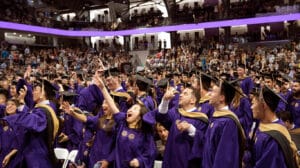McKinsey, BCG and Bain, collectively referred to as ‘MBB’, are widely recognized as the top management consultancy firms in the world. Each has well-established operations in several cities across the US.
In this article, we answer some top-of-mind questions for potential candidates. Questions like:
- Are consulting firms still managing to attract top talent in the US?
- What kind of candidates are recruited by McKinsey, BCG and Bain in the US?
- Which of the top-3 firms hired the most candidates?
- Are MBB firms in the US closing the gender hiring gap?
- Which of MBB’s US offices are the most selective?
- What’s the best route to MBB firms in the US for international students?
- Which universities and business schools provide the best route to breaking into top consulting firms?
The insights in this article come from a detailed analysis of over 4,700 individuals hired by McKinsey, BCG and Bain for client-facing consulting roles in the US from 2020 to mid-2022.
For city-specific insights, see our articles on the types of candidates who make it to McKinsey, BCG and Bain’s offices in New York, Chicago, Boston, Washington, DC, Atlanta, and Dallas & Houston.
Key takeaways
- Despite competition from the tech industry – which has led to increased compensation packages for MBB hires – consulting continues to attract some of the best talent in the US.
- The top universities that place undergraduates into top consulting firms include the University of Pennsylvania, Harvard, MIT, Yale and Brown.
- Top consulting firms in the US are hiring a growing number of experienced professional and advanced degree candidates. Together, these groups now represent 20% of MBB’s total hires in the US.
- McKinsey hired over 20% more consultants than BCG, and over 60% more than Bain, between Q1 2020 and Q2 2022.
- MBB firms are closing the gender hiring gap in the US, with 42% female hires overall. Offices in the North East are doing the best in this dimension, while offices in the South have the furthest to go in terms of achieving gender parity.
- For international candidates, an MBA is a great route to McKinsey or BCG, but less so at Bain. 33% of McKinsey’s MBB hires in the US obtained their undergraduate degree from an international university, compared to 20% at BCG and only 11% at Bain.
- Not all of MBB’s US offices are equally selective. While offices in the North East make most of their hires from nationally top-ranked universities, offices in the South make most of their hires from regional universities that fail to place their students outside their region, suggesting lesser selectivity.
- Half of all MBA hires into MBB’s US offices come from five schools: Wharton, Kellogg, Booth, Harvard Business School and Columbia Business School.
The top trends in management consulting hiring in the US
Management consulting continues to attract some of the best talent in the US, despite increased competition from the tech industry
McKinsey, BCG and Bain attracted some of the best talent in the US between Q1 2020 and Q2 2022. Multiple factors support this assertion. The universities that contribute most of the pre-experience student hires into MBB are the same schools that occupy the top spots of any university rankings. Top US business schools also supplied the majority of MBA hires into McKinsey, BCG and Bain in the US.
Despite these wins, talent attraction in top consulting firms has been under pressure recently, especially from the tech industry. In our article on the type of candidates who make it to McKinsey, BCG and Bain in San Francisco, we see that only 10% of pre-experience student hires and 5% of MBA hires graduated from Stanford University, the highest-ranked local university. This is likely to be due to the draw of Silicon Valley for undergraduates and MBAs.
The war for talent, combined with growth aspirations, has led to increased compensation packages for MBB’s hires in the US. Pre-experience students can now expect a $110,000 base salary or more, while MBA hires can expect $175,000 or more.
Top firms hire a growing number of experienced and advanced degree candidates
Traditionally, top consulting firms in the US have hired candidates who recently gained an undergraduate or MBA degree. 80% of all hires into McKinsey, BCG and Bain between Q1 2020 and Q2 2022 were either pre-experience students (45%) or MBAs (35%).
In recent years, the firms have increasingly sought to hire advanced degree candidates and experienced professionals, both to support their growth and to respond to their clients’ need for expertise in specific functions or sectors (e.g. technology). These channels now represent a significant proportion of MBB hiring in the US: 16% for experienced hires and 4% for advanced degree hires.
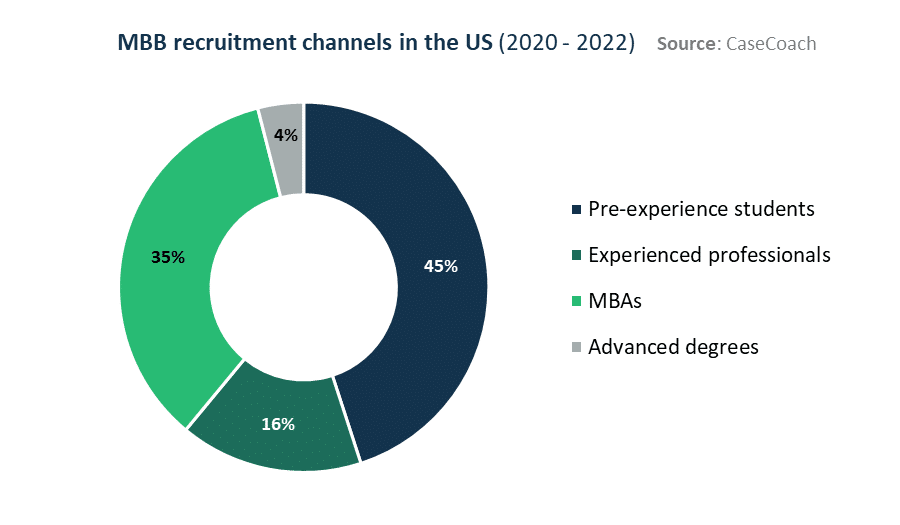
To understand these categories better, here are quick definitions:
- Pre-experience students (bachelor’s degree or a non-MBA master’s degree) are hired out of university or shortly after. They typically have no more than two years of experience and are hired into entry-level roles (i.e. Business Analysts at McKinsey, Associates at BCG and Associate Consultants at Bain).
- MBA hires are graduates of a one or two-year MBA program. They typically have work experience gained before their MBAs and are hired into post-MBA roles (i.e. Associates at McKinsey and Consultants at BCG and Bain).
- Experienced hires are from other employers and typically have two to eight years of experience. Those with less are hired at pre-MBA roles (i.e. Senior Business Analysts at McKinsey, 2nd year Associate Consultants at Bain and Senior Associates at BCG). Those with significant experience are hired into post-MBA roles (i.e. Associates at McKinsey or Consultants at BCG and Bain).
- Advanced degree hires are hired during or soon (not more than two years) after their Ph.D. or medical school programs. In the US, they’re typically hired into post-MBA roles, (i.e. Associates at McKinsey and Consultants at BCG and Bain).
Mckinsey hired more candidates than BCG and Bain
In the US as a whole, McKinsey hired over 20% more consultants than BCG, and over 60% more than Bain, between Q1 2020 and Q2 2022. While this held true for most major US offices, a standout exception is Boston, where Bain hired over 70% more consultants than McKinsey and close to 20% more consultants than BCG.
The data also tells us which of MBB’s US offices hired the most consultants, potentially pointing to the sizes of these offices. MBB’s New York offices had the greatest number of hires, with over 850 identified between Q1 2020 and Q2 2022. The next largest office was Chicago, with over 450 hires identified, followed by Boston and San Francisco, each with over 300 hires.
MBB firms in the US are closing the gender hiring gap
Overall, 42% of MBB’s consultant hires in the US between Q1 2020 and Q2 2022 were female. Although parity has not been reached, the imbalance is greatly reduced by historical standards.
This is not, however, consistent across firms, offices and channels. McKinsey was the closest to meeting gender hiring parity with 44% female hires, while BCG and Bain each had ~40% female hires.
There was significant disparity among MBB’s offices across the US, with the North-East offices (New York, Boston, Washington, DC) achieving the highest rate of female hiring (43-47%) and Southern offices (Atlanta, Dallas & Houston) recording the lowest rate of female hiring (33-36%).
Overall, the data shows there is still some room for improvement when it comes to gender parity, with countries such as Canada, the UK and Switzerland beating the female hiring percentage in the US.
An MBA is a great route to McKinsey or BCG for international candidates, but less so at Bain
There are only two significant channels for international candidates to get into MBB firms in the US: as an MBA hire from a top US business school or as an experienced hire.
The MBA route is the most favorable. 23% of MBA hires into MBB firms in the US graduated with an undergraduate degree from an international university, compared to 10% of experienced hires.
One potential driver of MBAs as a great route for international candidates in the US is that McKinsey, BCG and Bain are some of the few firms outside of tech (and, in certain circumstances, finance) willing to sponsor international candidates for an H1B visa.
This opportunity, however, is not evenly split by firm. 33% of the MBA hires into McKinsey’s US offices obtained their undergraduate degree from an international university. This is in contrast to BCG and Bain, where 20% and 11% of MBA hires respectively had an international undergraduate degree.
Likewise, some US offices are more open to MBA hires with international undergraduate degrees, including Chicago (31%) and San Francisco (38%), while others are less open (e.g. Boston at 15%).
Other channels do not offer any meaningful route into MBB firms in the US. Less than 0.5% of pre-experience students are hired from international universities.
Not all US offices are equally selective
Anecdotally, some MBB offices in the US are thought of as harder to get into than others. The data indicates that there is some truth to these rumors, as differing levels of candidate selectivity were observed in MBB offices across the US between Q1 2020 and Q2 2022.
We can measure sensitivity using the proportion of hires who come from national feeder universities compared to the proportion who come from regional feeders. National feeders typically place in the top-10 contributors of pre-experience student hires across all MBB offices in the US. They include the University of Pennsylvania, Harvard, MIT, Yale, Brown and Duke.
Regional feeders are primary sources of hires to nearby offices but do not contribute significantly to hiring in US offices outside their region. Thus the higher the national feeder proportion, the more selective the office.
For pre-experience student hiring, over 85% of the hires into MBB’s New York, San Francisco and Boston offices were from prestigious national feeder universities (e.g. the University of Pennsylvania, Harvard, etc). Of the three locations, the New York office was the most selective, with over 95% of hires from national feeders.
Locations with lower levels of selectivity include Washington, DC, where 63% hires came from national feeders, and Chicago (46%). The least selective of the US offices we analysed were Atlanta, with 30% of hires from national feeders, and Dallas & Houston (23%).
MBA hiring shows the same patterns, with North-Eastern offices recruiting primarily from national feeder schools and Southern offices recruiting primarily from regional schools.
McKinsey, BCG and Bain’s pre-experience student hiring in the US
Pre-experience students made up 45% of total hires by McKinsey, BCG and Bain in the US from Q1 2020 to Q2 2022. This means that hires from a bachelor’s degree or a master’s degree program (excluding MBAs) made up the largest recruitment channel for entry-level roles at the US offices of McKinsey, BCG and Bain.
The pre-experience student recruitment channel was the largest for almost all the US offices we analysed, making up 40%-47% of all hires. However, in our analysis of the type of candidates who make it to MBB firms in Chicago, we saw that MBA hires there (42%) outnumbered pre-experience student hires (39%).
Pre-experience student hires made up 56% of Bain’s hiring in the US, compared with 41% for McKinsey and BCG. Despite this, McKinsey still nominally hired the most pre-experience students due to having the largest number of hires.
The top universities for joining McKinsey, BCG or Bain with an undergraduate degree
Pre-experience student hires into MBB’s US offices came from over 175 universities. Of these, only two universities contributed more than 4% of hires: the University of Pennsylvania (11%) and Harvard University (7%).
The next 22 universities contributed between 1%-4% of all hires, making up 55% of all pre-experience student hires. Finally, the long tail consists of over 150 schools, contributing 27% of all pre-experience student hires.
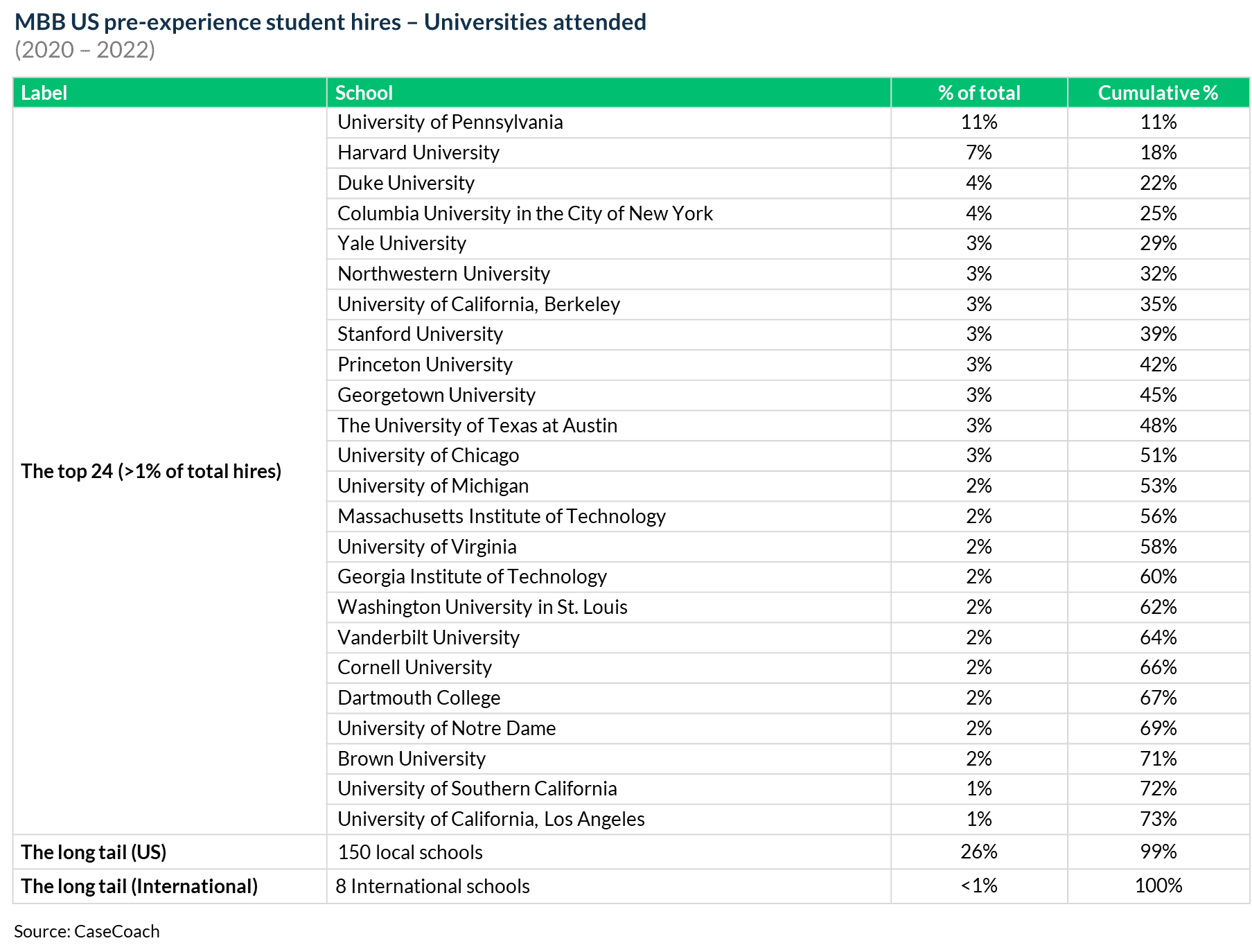
These universities can be categorized into national feeders and regional feeders. The national feeders typically place in the top-10 contributors of pre-experience student hires across all MBB offices in the US. They include the University of Pennsylvania, Harvard, MIT, Yale, Brown and Duke.
Regional feeders are primary sources of hires to nearby offices but do not contribute significantly to hiring in other US offices outside their region. For example, in Chicago, we see significant hiring from the University of Notre Dame, Washington University in St. Louis and Indiana University Bloomington. MBB’s Dallas & Houston offices hire significantly from The University of Texas at Austin, Texas A&M University and Southern Methodist University. These universities, however, do not contribute significantly to hiring in other US locations.
Regional feeder schools are a great route for candidates who are looking to join a specific MBB office in the US.
The top degree subjects in universities for joining an MBB firm in the US
Across the US, graduates of three disciplines stood out in MBB firms’ pre-experience student hiring. 30% of pre-experience student hires graduated with an economics degree, 14% with an engineering degree, and 12% with a business administration degree. The remaining 44% studied a variety of other disciplines. Individual US offices had similar splits to the US total.
McKinsey, BCG and Bain’s MBA hiring in the US
35% of all hires into McKinsey, BCG and Bain in the US came from an MBA program. This is the highest rate of MBA hiring we’ve observed in all consulting markets we’ve explored. This proportion holds true for all three firms, as MBA hires made up 31-37% of hires across the board.
As a reminder, MBA hires are graduates of an MBA program, usually at a US business school. They typically have some work experience, gained before their MBAs, and are hired into post-MBA roles (i.e. Associates at McKinsey and Consultants at BCG and Bain).
For MBA hires, we will explore the business schools and undergraduate programs that produced the most MBA hires.
The top business schools to join McKinsey, BCG or Bain with an MBA
MBA hires into McKinsey, BCG and Bain in the US came from about 60 business schools, only seven of which are outside of the US. Half (50%) of all MBA hires into the US offices of MBB firms come from only five schools:
- The Wharton School (12%)
- Kellogg School of Management (11%)
- Chicago Booth School of Business (11%)
- Harvard Business School (10%)
- Columbia Business School (6%)
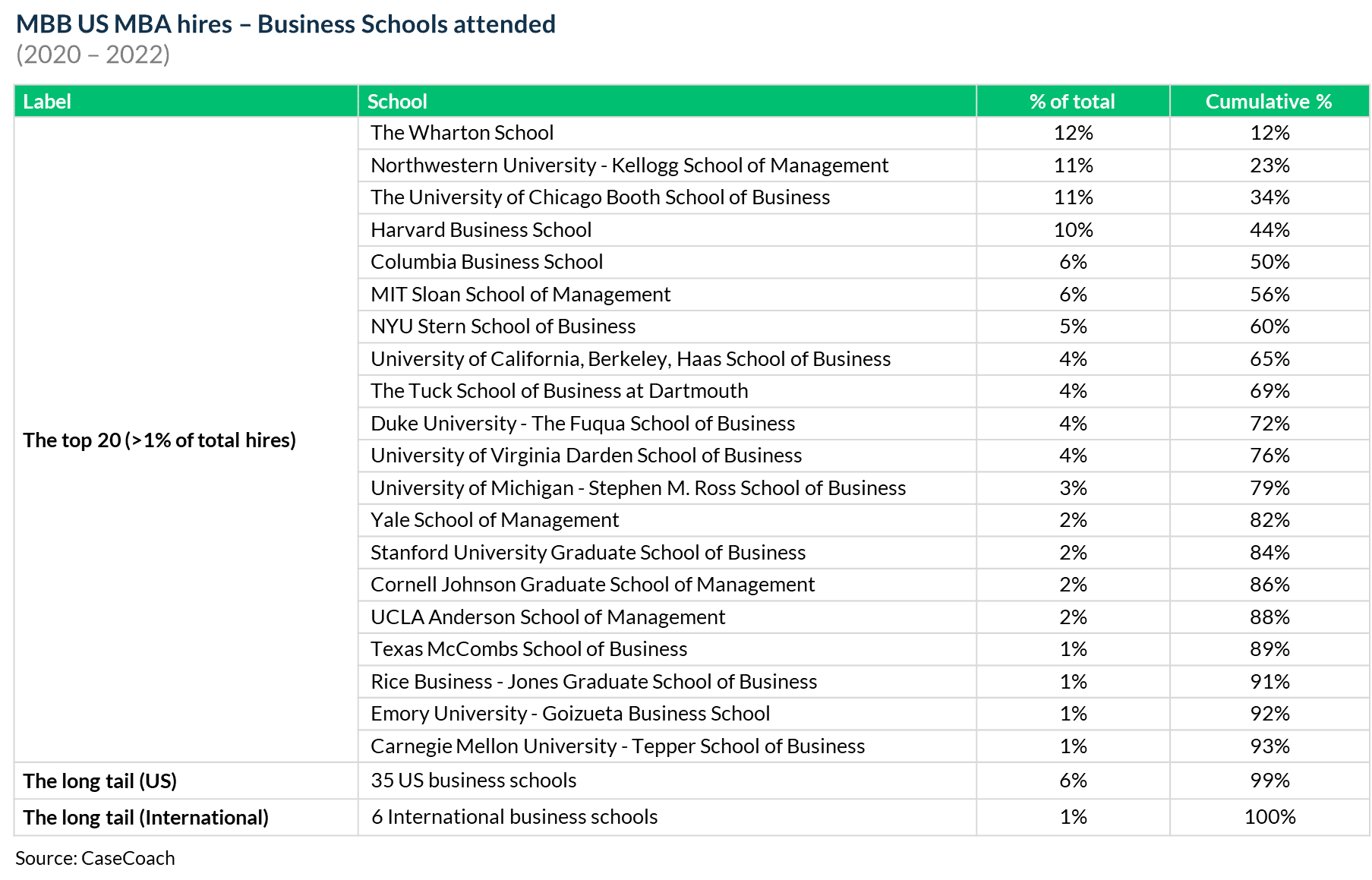
As with universities, we also have national and regional feeder business schools.
National feeder business schools typically place among the top contributors of MBA hires across all MBB offices in the US. Wharton, Kellogg, Booth, Harvard and MIT Sloan are all national feeder business schools.
Regional feeder business schools are primary sources of MBA hires to nearby offices but do not contribute significantly to hiring in other US offices outside their region.
Let’s consider examples of regional feeders:
- UC Berkeley’s Haas School of Business contributes almost a quarter (24%) of MBA hires to MBB’s San Francisco office.
- The Ross School of Business was the third largest contributor of MBA hires into MBB’s Chicago offices, accounting for about 10% of hires.
- Goizueta Business School provided 16% of the MBA hires into MBB’s Atlanta office.
None of these schools, however, feature among the top 7-10 contributors of MBA hires to other US offices of MBB firms. Thus, regional feeder schools are great for candidates who are looking to join a specific MBB US office with an MBA.
INSEAD is the only international business school that features prominently among MBA feeders to MBB firms in the US. While it contributes just under 1% of MBA hires, that is still about twice the number of MBA hires from all other international business schools combined.
Which undergraduate schools produced the most MBB MBA hires?
The majority of MBA hires (63%) received an undergraduate degree from one of the US universities that generated pre-experience student hires. 23% of MBA hires come from international undergraduate programs, making this the best channel of entry for international candidates. Finally, the remaining 14% of MBA candidates received their undergraduate degrees from US schools that do not feed pre-experience student candidates into MBB’s US offices.
McKinsey, BCG and Bain’s experienced professional hiring in the US
The ‘experienced hires’ channel, in which candidates typically have two to eight years of professional experience, was the third-largest recruitment channel for MBB’s US offices from Q1 2020 to Q2 2022. It made up 16% of all their hires.
At McKinsey, experienced hires made up 19% of total US hires, compared to 17% for BCG and only 11% for Bain. In nominal figures, this means that McKinsey hired almost three times as many experienced hire candidates as Bain.
Experienced hires joined MBB firms in the US at different levels:
- 38% of experienced hires were recruited into pre-MBA roles (i.e. Business Analysts at McKinsey, Associate, Senior Associate Consultants at Bain and Senior Associates at BCG).
- 62% of experienced hires were recruited into post-MBA roles (i.e. Associates at McKinsey and Consultants at BCG and Bain). Candidates with team leadership experience at other consulting firms sometimes join at a more senior level but will typically experience a small step back in seniority compared to their previous firm.
Which industries did the US MBB’s experienced hires come from?
Over a third (34%) of experienced hires into MBB’s US offices came from other consulting firms. These include strategy consulting firms (e.g. L.E.K, Oliver Wyman, ZS), the strategy teams of ‘Big-4’ accounting firms (e.g. Strategy& at PwC and EY-Parthenon), and Accenture.
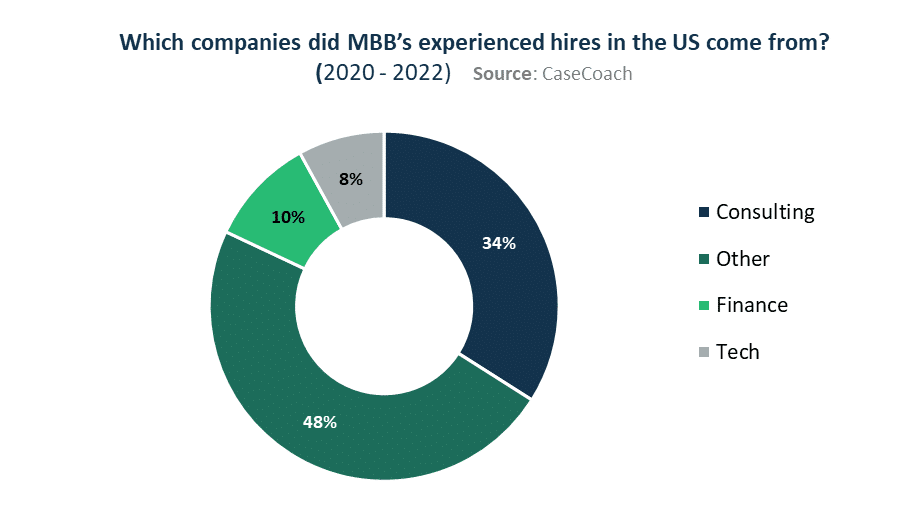
The finance industry contributed about 10% of experienced hires and tech contributed 8%. The remaining 48% came from a wide range of unrelated industries.
While almost all the top feeders of experienced hires into MBB in the US are other consulting firms, some non-consulting firms stand out. One of them is Exxon Mobil, which supplied a significant number of engineers to MBB firms in the US, primarily to McKinsey’s Houston offices.
Where did MBB’s experienced hires go to school?
As with MBA hires, the top contributors of pre-experience students to McKinsey, BCG and Bain in the US are the universities attended by most experienced professional hires.
McKinsey, BCG and Bain’s advanced degree hiring in the US
More and more advanced degree candidates are being hired by top consulting firms, and from our analysis, the US seems to be leading the charge.
To put this into perspective, we saw in our analysis of the type of candidates who make it to MBB firms in Germany that the country had the second-largest advanced degree hire population in the world. It had over 30% more advanced degree hires than the UK, Canada, France, Switzerland, Australia and the Middle East combined. MBB firms in the US, however, hired nearly 2.5 times as many advanced degree candidates as those in Germany.
Despite this, advanced degree hires only made up 4% of all hiring by MBB’s US offices due to the sheer size of hiring in the US.
As with other channels, top US schools contributed the most advanced degree hires, including Harvard (10%), Stanford (8%) and Princeton (5%). An interesting fact about the seven international universities represented is that most of the candidates they supplied had a post-doctoral research role in a top US school before joining McKinsey, BCG or Bain.
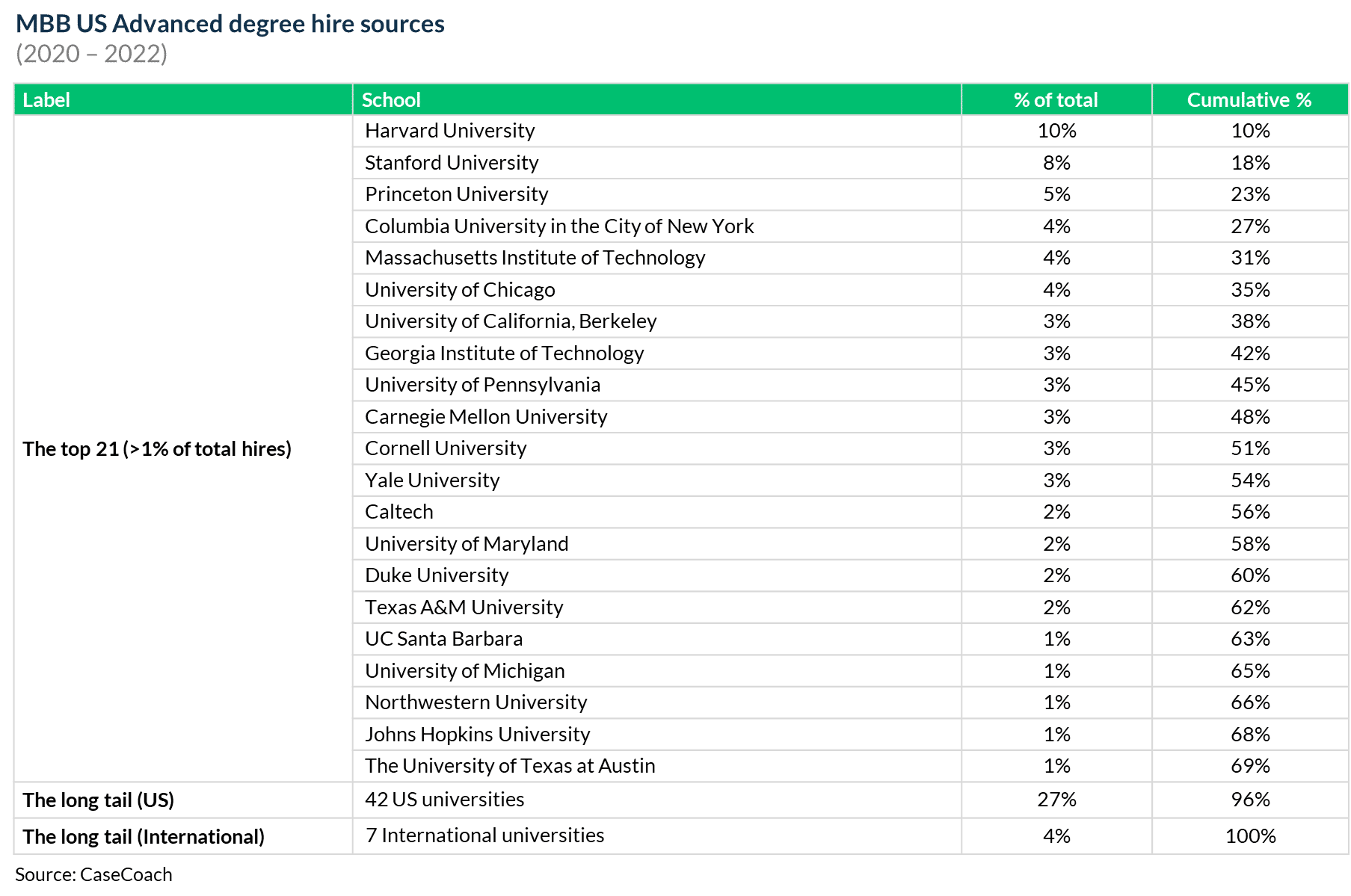
What’s next if you’d like to get into McKinsey, BCG and Bain in the US
Looking to join McKinsey, BCG or Bain’s US offices? CaseCoach has resources to guide you all the way from the resume crafting stage to your final interviews.
Our Free Resume Course provides resume and cover letter templates and specialized advice for students, MBAs and experienced professionals.
The Consulting Interview Prep Toolkit contains all the resources you need to ace your case and fit interview, including online courses, sample interviews, case material and practice tools.
CaseCoach’s team of coaches includes former consultants and interviewers with McKinsey, BCG and Bain in the US. They are available to deliver case and fit interview coaching and mock interviews in a realistic setting to put your preparation to the test, providing personal feedback and practical advice to help you ace your interviews.

